Tom Hayden on Iraq: Beyond the Horizon, the Storm
From the archives: In 2006, the social activist warned that an increasingly mainstream anti-war movement can be prone to loss of focus.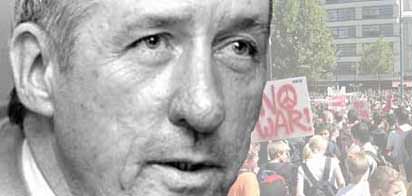
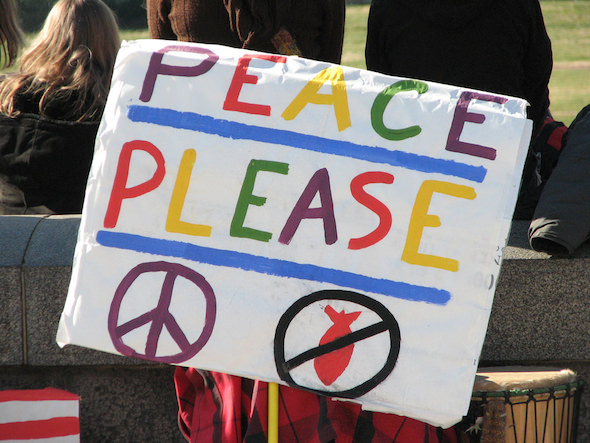
A demonstrator at a 2007 antiwar rally in Washington. (Jonathon Colman / CC 2.0)
Editor’s note: Tom Hayden, an activist, author and longtime Truthdig contributor, died Sunday at age 76. In his memory, Truthdig is sharing one of Hayden’s pieces each day this week. This article was originally posted April 25, 2006.Finally, climactic possibilities, if not the endgame, are ahead in Iraq.
The peace movement can shape the outcome by maintaining a pressure role in close political races, blocking military recruiters on campuses, calling for the truth about the president’s impeachable offenses, and not giving up now that the Iraq war is mainstreamed into the center of national debate.
Politically, the most significant new development is Sen. John Kerry’s call for military withdrawal by the end of this year. Kerry stands a definite chance of filling the moral void in the present political process. When he steadfastly embraces his record as a young man, the message resonates in several ways. He reminds Americans that moral courage can turn history around, and that we need to listen more carefully today to those who were right ahead of their time. The similarities between then and now — especially the deaths of American soldiers for draft-dodging politicians who refuse to admit their mistakes — is a powerful background echo that will not go away.
Kerry follows Feingold, Murtha and John Edwards among national politicians calling for withdrawal in one form or another. Together they are generating expectations from the rank and file of the Democratic Party and placing pressure on the party leadership to abandon its commitment to expedient silence.
The pressure will only accelerate as the presidential primary season begins, with strong peace caucuses in Iowa and New Hampshire shaping up. Unless Hillary Clinton rapidly repositions herself — which history reveals is a family trait — she could face turbulent crosswinds in the primaries just ahead.
Kerry reflects a force greater than a single senator. Not only is he a once and future presidential candidate, he is representative of those at the higher levels of power who regard the Iraq war as a setback for American geopolitical interests. These establishment dissidents are numerous in the ranks of the Central Intelligence Agency and the upper echelons of the military. As a power elite in C. Wright Mills’ sense, they favor a more multilateral, multipolar approach to global stability. Increasingly they are showing signs of becoming unhinged at the counterproductive approaches of the Bush White House and the neoconservative hawks. They favor extrication from Iraq and the removal of Bush from the White House, in sequence or both at once.
In addition to whatever popular support he can generate, Kerry is the current candidate of this dissenting element of the power elite, as he was in November 2004. In 1968, there were “the wise men,” a discreet gathering of corporate lawyers, diplomats and security strategists who advised President Johnson that the costs of Vietnam were greater than any of the benefits. In the phrase of Robert Lovett and Dean Acheson, their view was “to hell with the cheese, let’s get out of the trap.” LBJ dropped out of the presidential race, and subsequent U.S. policy was to withdraw American troops while escalating the secret bombing campaign. The fatal weakness in the strategy was the total inability of the South Vietnamese army to defend itself. Is the same scenario playing out today?
As The New York Times finally reported on Monday, April 24, the “wise men” are being recreated through the “Iraq Study Group,” funded by Congress, co-chaired by James Baker and Lee Hamilton, and including such power brokers as William Perry, Rudolph Giuliani, Sandra Day O’Connor, Vernon E. Jordan, Robert Gates, Leon Panetta, Charles Robb and Alan Simpson.
The earlier “wise men” were drawn more from the private-sector elites, while the “study group” reflects a powerful network of public and private centrists. But the purpose is unquestionably the same: to develop an exit strategy from Iraq that reduces American casualties in Iraq, saves America’s face as a superpower, protects American economic interests in the region, and effects a bipartisan “solution” to the conflict.
This maneuvering should not be confused with a military withdrawal plan, but could lead to one if costs continue to outpace any benefits. Here is how:
- The U.S. could arrange for its newly established Iraq government to request a phased U.S. withdrawal, thanking Washington for the removal of Saddam Hussein;
- In keeping with the “redeployment” strategy proposed by the Democratic-leaning Center for American Progress, the U.S. could withdraw some 40,000 troops this year, mostly sending National Guard units back to their home states. The withdrawal of 60,000 to 80,000 more could be promised by the end of 2007;
- The U.S. troops would be replaced by peacekeeping units already pledged, at least informally, by other governments not involved in the U.S.-UK military coalition;
- The current Baghdad regime would remain transitionally, propped up by side understandings with the Arab League (for the Sunnis), the Shiites (through secret diplomacy with Iran) and the Kurds (by guarantees of their status quo);
- Power-sharing over political offices, security, oil resources and economic development could be guaranteed by the largest U.S. embassy in the world;
- Most of the nationalist resistance would organize a cease-fire during the guaranteed U.S. troop withdrawal.
On a scale of 10, the likelihood of this plan, known internally to the Pentagon as the “Philippine option,” is currently between zero and one.
But parts of it could be put in motion very rapidly if the pressure of public opinion and alternatives like Kerry’s proposal gain traction during Iraq’s seething summer and the unfolding election campaign at home. So-called “defense sources” recently told The Washington Times that a U.S. withdrawal of some 40,000 troops “was the level they would like to see announced before year’s end.” (Washington Times, March 30, 2006). Army Gen. George Casey has prepared “fairly substantial” troop reductions as a White House option.
More likely is a scenario of modest redeployments to reduce American casualties, combined with ethnic cleansing by death squads in mixed areas like Baghdad, and political drift toward a de facto “three state” solution, advocated openly by the leader of the Shiite alliance, Abdul Aziz al-Hakim (New York Times, March 15, 2006).
The role of the U.S. and UK in this scenario is one of the most guarded secrets of the war. British secret forces, garbed as armed Arab mujahadeen, were caught and exposed in Basra last year, but no details of their mission have been clarified. The U.S. has run torture camps in “black rooms” at Camp Nama through a secret entity known only as Task Force 6-26. The Christian fundamentalist general William G. Boykin whitewashed the patterns of abuse in a 2004 report, but the torture was confirmed in extensive media coverage (New York Times, March. 19, 2006). Despite pleas and propaganda favoring Iraqi unity, The Wall Street Journal reports that some — including Peter Galbraith, a former Balkans ambassador and a Democrat — “argue the US and Iraqi governments should begin preparing for a partition that might be inevitable, or even desirable? (Wall Street Journal, March 14, 2006).
Between these wobbling scenarios, one thing is clear: The opposition to the U.S. occupation among Iraqis is rising past the breaking point. This is the indisputable “secret’ that the American media rarely reveal. The recently leaked “Provisional Stability Assessment” reports “serious” or “critical” security situations in six of Iraq’s 18 provinces, including Baghdad and Basra (NYT, April 8, 2006), which means the invasion and occupation have failed to suppress the resistance in most of the country. More stunning, the percentage of all Iraqis favoring a timeline for U.S. withdrawal has risen from 30% in February 2004 to 76% in February 2005 to 87% in February of this year (NYT report of data collected by Brookings Institution, March 19, 2006). This means that excluding the pro-American Kurds from the survey virtually all other Iraqis favor a concrete timetable. There is no better measure than this data of the amoral bankruptcy of American policy. Our government has dispatched over 3,000 Americans to their death, and taken hundreds of billions from American taxpayers, for a conflict from which 87% of Iraqis want us to withdraw.
All of which means an opportunity for the peace movement in this year’s congressional elections, where the most cynical of pundits acknowledge that Republicans are deeply worried, and in the presidential year just around the corner. The strategy of pressuring the pillars of policy — public opinion, military recruitment, congressional funding priorities, expensive oil dependency and the faltering “coalition of the willing” — is steadily working.
Amid the agony, the opportunity exists for absorbing a deep public understanding that expeditionary wars like this one should never happen again. We no longer are a huddling minority, nor are we a co-opted Beltway faction. We are immersed in the gradual soul-searching currents of the mainstream, where loss of direction is a constant risk.
There are some voices of despair among peace advocates. The invaluable Scott Ritter, a former weapons inspector, believes the peace movement is actually losing, and needs a more centralized, warrior-like direction. Others feel that all the marches have had no effect, while others feel the growing need to take up other issues. The despair is understandable given the loss of lives, but absolutely unjustified. When in the course of a movement’s development it reaches the mainstream, the cause is adopted by millions, not by prophetic minorities. The radicals sometimes disappear in the midst of their own success.
Many activists are learning for the first time, or perhaps all over again, what it means to be winter soldiers in a long war. All the wasted lives can never be brought back, all those squandered tax dollars will never be redistributed, true enough. But if the war itself was never going to be a cakewalk, why should ending it be any different? It may still be far from over, with the simmering question of Iran on the immediate horizon. The fear of Al Qaeda continues to paralyze the American mind; one top Washington journalist even told me this week that the difference between withdrawing from Vietnam and from Iraq is that there was “no Al Qaeda threat” back in the day, as if a U.S. withdrawal from Iraq somehow would increase the chances of Al Qaeda attacking New York again. (What’s stopping them from doing it now, port security?) It should be energizing to live on borrowed time.
At a similar point of despair during the late 1960s, few of us could see the gathering storm of public outrage over war and Watergate that would drive Nixon from the White House and terminate the funding of war. Overnight, the storm finally broke, but it had been building for years. That memory still resides as a dream for one side of the ’60s generation and as a nightmare for Bush, Cheney and Rumsfeld. Just when the activists turned to rage, burnout or issues dearer to their lives, the great and mysterious force of public opinion was joining the movement to throw the bastards out for going too far, for lying too much, for wasting good money after bad and, above all, for encouraging Americans to die for no reason. That was the time that gave rise, unexpectedly, to John Kerry and the “Vietnam syndrome” that the establishment Machiavellians feared so much that they went to war one more time to try to stamp it out. “By God, we’ve kicked the Vietnam syndrome once and for all,” declared President Bush — 15 years ago. Now the syndrome is back, by God, and we should spread it everywhere, for today and for the future.
The peace movement should build a community of meaning to stay the course, as long as the syndrome of empire exists. When you think about it, we are living at a tumultuous moment in a 500-year history of crusades, slavery, colonialism and patriarchy. When we act with personal urgency, as we should, it still brings results only gradually. When we take strong public stands, as we should, the effects are often unseen. When we become militant, as we should, we still reach the moderates only marginally. Connecting the dots of empire is hard, but rewarding. Imagining a new story, one beyond empire, will take time and work, but the work is good. The Machiavellians will never recognize the movement’s work, or will do it only in ways that we will not recognize. The recognition will be for historians and poets. Our reward, as Bobby Sands once wrote from prison, will be seen in the smiles of our children.
Independent journalism is under threat and overshadowed by heavily funded mainstream media.
You can help level the playing field. Become a member.
Your tax-deductible contribution keeps us digging beneath the headlines to give you thought-provoking, investigative reporting and analysis that unearths what's really happening- without compromise.
Give today to support our courageous, independent journalists.
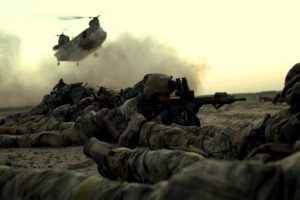

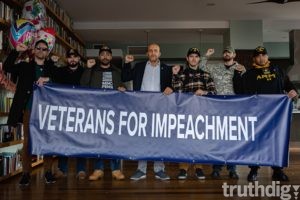

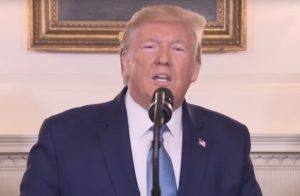



You need to be a supporter to comment.
There are currently no responses to this article.
Be the first to respond.